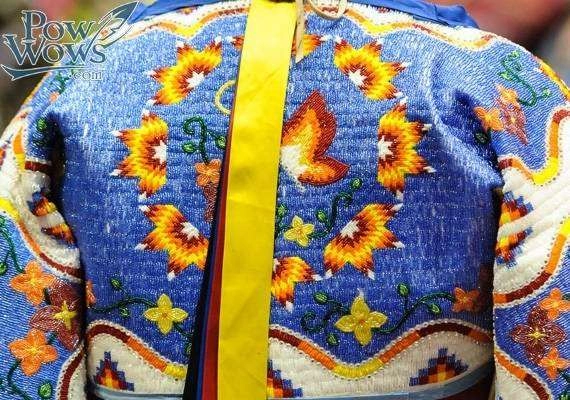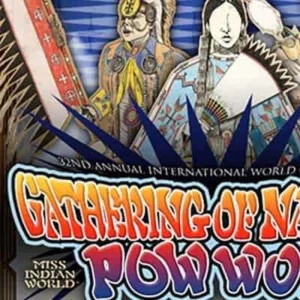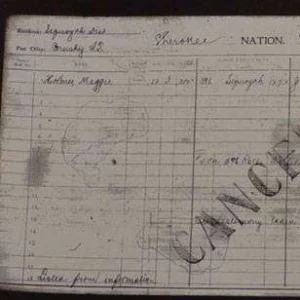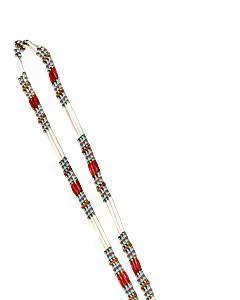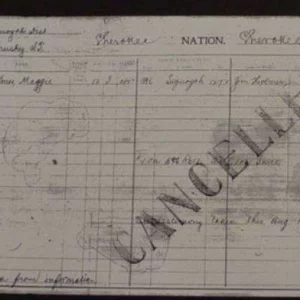Powwow Family
By Katrina Clark
Growing up we learn a lot from our parents like manners and sayings but most importantly we learn family traditions. Some families have that same star on their tree at Christmas, others always have a turkey at Thanksgiving, and some go to the same ball game each year. My family tradition is going to powwows.
There are three generations of powwow goers in my family. We have everything from dancers to artists to drummers and singers in the family.
It all started with my Grandfather Chet Clark who was born to the Salt Clan & the Towering House Clan of the Navaho Nation. He grew up in Klagetoh, Arizona where he lived with his brothers, sisters and his parents; Haatalii Key Clark and Navaho Weaver Leah Clark. From his Father, my Grandfather grew up the traditional Navajo way by learning drum making and signing. He also learned the ways of his medicine man Father.
Chet Clark’s mother also had her ways of teaching the children and one of those things was how to make fry bread. She was said to have the best fry bread around. Cooked to perfection my grandpa would later tell me as he passed the lessons on to my sister and I. Then there were my Great-Grandmother’s rugs, woven tapestries of perfection with every line just right and every design planned to the T. Even though she has now passed away, her rugs are still things of beauty.
Though life in Klagetoh was good, my Grandfather wanted to find out what the rest of the world held. So at the young age of 10 he left for the bus stop were he would board the bus for school in California and to a whole new world.
Have you ever heard the saying “You learn from your mistakes?” Well what happened next was the best mistake in my family history. Having boarded what he thought to be a bus to California was instead a bus to Keizer, Oregon, where my Grandfather became the newest student at Chemawa Indian School.
He grew up, graduated and met my Grandmother Donna Clark. He married her and become a father of four. One of the four children would grow up and become my Father. Born in 1965 my Father Geronimo Clark grew up not really knowing much about his native culture. It wasn’t like my Grandfather, who grew up with it in his veins. “It was more subtle” my Father said, “We really didn’t grow up knowing that much about our culture. Yeah we went to a few powwows at Chemawa but that was it.”
As a young child my Father got to visit Arizona. It was very surprising for him because there were no modern conveniences anywhere at home. It was a real culture shock my Father would later tell us. But with the sights and sounds of Arizona swirling in his head, my Father decided to turn his passion for art in to something that would show the world his love for his Native American heritage. My Father’s art work has been sold all over the world and has been hung in both museums and private collections. His art has even been in some United States Embassies. But while his art work has been sold worldwide, my Father decided to stay in Oregon. This was a good thing to because if he had not he would have never have met my Mother, Marcie Clark.
Unlike my Father, my sister and I were raised within our Navajo culture. My family started going to powwows when we were babies and as soon as we could walk my Mother made us regalia and we started dancing. While on the powwow trail, my Grandparents drummed and sang, Father sold his artwork and my Mom kept us encouraged, dressed, clean and cheered us on.
We danced Traditional, Fancy Shawl & Jingle dress. But like most kids, the older we got the more we lost interest and by the time we were teens, powwows became a thing of the past.
But one day many years later my sister announced that she wanted to start Jingle Dress Dancing and that’s all it took for the flames to start again. Before we knew it we were going to every powwow from Navajo Land to Washington.
Who’s to say where tradition starts? Maybe from a story we heard as children or the lessons our ancestors taught us? To me no matter where it comes from, I know one thing for sure; Native Americans need to keep it alive whether it is drumming and singing in your native language or even modeling your jingle dress after your Great-Grandmother’s rug. Tradition is important. It is like a tree, the more we nurture it the more it will grow and the more it grows the more people can appreciate it for generations to come – just like my family has and always will appreciate our culture.
Last Updated on January 8, 2024 by Paul G
